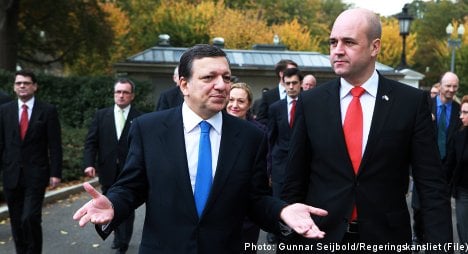At a summit in Brussels on Thursday, the 27 heads of state and government want to name, unanimously if possible, the president and a foreign policy supremo to represent Europe on the world stage.
“I need of course the collaboration of my colleagues to try to get this through tomorrow night,” Reinfeldt said in Stockholm ahead of the political horse-trading.
The EU summit “might take a few hours, it might take all night,” warned Reinfeldt, who will chair the talks as his country holds the EU’s rotating presidency.
Belgian Prime Minister Herman Van Rompuy remains the most favoured name, but no candidate has been able to strike the delicate balance required for either of the key posts, which were created by the new Lisbon reform treaty.
In recent months a score of names has been raised, and many discarded, as EU leaders seek a personality with some charisma but modest enough not to hog the limelight.
Reinfeldt said he had worked overtime trying to get in touch with other leaders but suggested that much remains to be done before the Brussels summit dinner.
“Try to get into contact with 26 head of states within 24 hours, good luck,” he said.
“These are people who tend to have other things to attend to as well, besides talking to me.”
Experts agree that a technocrat capable of building consensus among countries and the EU’s main institutions — the council of nations for the 27 member states, the European Commission and the European parliament — is required for president.
Former British premier Tony Blair has been the most high-profile name floated, but his key role in the 2003 invasion of Iraq divided Europe and despite continued backing from London, his star has faded.
Typically, a number of candidates have emerged from mid-sized pro-European nations, such as Van Rompuy and Dutch Prime Minister Jan Peter Balkenende.
Luxembourg Prime Minister Jean-Claude Juncker, Europe’s longest-serving leader, is also in the running for a term of up to five years that could set the standard for the post in future.
Former Irish premier John Bruton has been trumpeting his own cause in the media.
Calls have mounted for women to be nominated, but only former Latvian president Vaira Vike-Freiberga has come forward, and analysts say she may be too pro-American and anti-Russian.
While it is not set in stone, it is widely accepted that the president should come from the centre-right, which dominates the European parliament, and the foreign affairs chief be a socialist, the second formation.
For the latter, post Britain’s Foreign Secretary David Miliband was widely touted, but he insists he is not available. Clearly if he did get the job that would torpedo Blair’s chances, with two Britons unlikely to win top jobs.
Former Italian premier Massimo D’Alema appears to have the right credentials, and he received a ringing endorsement on Tuesday from EU foreign policy chief Javier Solana, whose job will disappear next year.
“I think he would make a great high representative for the European Union,” said Solana, who as current top EU diplomat negotiates on behalf of the bloc in the Middle East, Iran and the Balkans.
The Spanish government is pushing Foreign Minister Miguel Angel Moratinos, while Britain’s EU Trade Commissioner Catherine Ashton is another possibility.
After months of speculation, Swedish officials hope for real movement once the leaders are alone at dinner, away from the interest groups driving debate.
If consensus proves elusive, the decisions could be made by qualified majority.


 Please whitelist us to continue reading.
Please whitelist us to continue reading.
Member comments